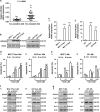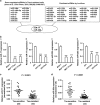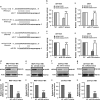Decreased expression of microRNA-17 and microRNA-20b promotes breast cancer resistance to taxol therapy by upregulation of NCOA3
- PMID: 27831559
- PMCID: PMC5260895
- DOI: 10.1038/cddis.2016.367
Decreased expression of microRNA-17 and microRNA-20b promotes breast cancer resistance to taxol therapy by upregulation of NCOA3
Abstract
Chemoresistance is a major obstacle to effective breast cancer chemotherapy. However, the underlying molecular mechanisms remain unclear. In this study, nuclear receptor coactivator 3 (NCOA3) was found to be significantly increased in taxol-resistant breast cancer tissues and cells. Moreover, overexpression of NCOA3 enhanced breast cancer cell resistance to taxol, whereas depletion of NCOA3 decreased taxol resistance. Subsequently, we investigated whether NCOA3 expression was regulated by miRNAs in breast cancer. By bioinformatics prediction in combination with the data of previous report, miR-17 and miR-20b were selected as the potential miRNAs targeting NCOA3. By real-time PCR analysis, we found that miR-17 and miR-20b were significantly reduced in taxol-resistant breast cancer tissues and cells. In addition, we provided some experimental evidences that miR-17 and miR-20b attenuated breast cancer resistance to taxol in vitro and in vivo models. Furthermore, by luciferase reporter assays, we further validated that both miR-17 and miR-20b directly binded the 3'-untranslated region of NCOA3 mRNA and inhibited its expression in breast cancer cells. Finally, both miR-17 and miR-20b levels were found to be significantly negatively correlated with NCOA3 mRNA levels in breast cancer tissues. Together, our results indicated that loss of miR-17 and miR-20b enhanced breast cancer resistance to taxol by upregulating NCOA3 levels. Our study suggested miR-17, miR-20b and NCOA3 may serve as some predictive biomarkers and potential therapeutic targets in taxol-resistant breast cancer treatment.
Figures







References
-
- Giannakakou P, Sackett DL, Kang YK, Zhan Z, Buters JT, Fojo T et al. Paclitaxel-resistant human ovarian cancer cells have mutant beta-tubulins that exhibit impaired paclitaxel-driven polymerization. J Biol Chem 1997; 272: 17118–17125. - PubMed
-
- Anzick SL, Kononen J, Walker RL, Azorsa DO, Tanner MM, Guan XY et al. AIB1, a steroid receptor coactivator amplified in breast and ovarian cancer. Science 1997; 277: 965–968. - PubMed
MeSH terms
Substances
LinkOut - more resources
Full Text Sources
Other Literature Sources
Medical
Miscellaneous

